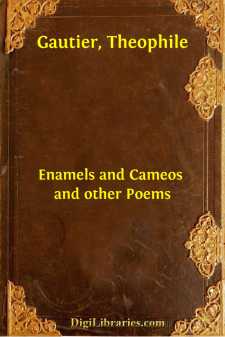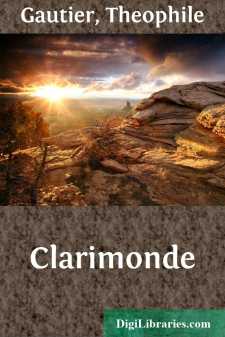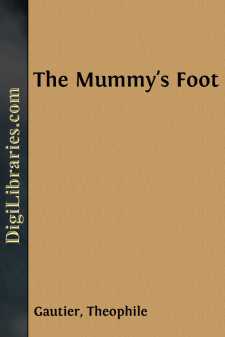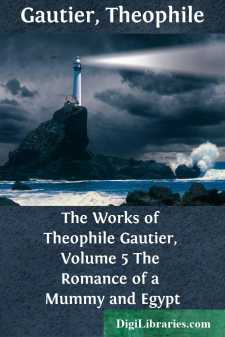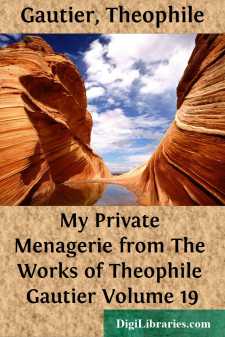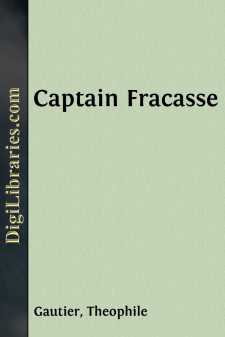Categories
- Antiques & Collectibles 13
- Architecture 36
- Art 48
- Bibles 22
- Biography & Autobiography 813
- Body, Mind & Spirit 142
- Business & Economics 28
- Children's Books 15
- Children's Fiction 12
- Computers 4
- Cooking 94
- Crafts & Hobbies 4
- Drama 346
- Education 46
- Family & Relationships 57
- Fiction 11828
- Games 19
- Gardening 17
- Health & Fitness 34
- History 1377
- House & Home 1
- Humor 147
- Juvenile Fiction 1873
- Juvenile Nonfiction 202
- Language Arts & Disciplines 88
- Law 16
- Literary Collections 686
- Literary Criticism 179
- Mathematics 13
- Medical 41
- Music 40
- Nature 179
- Non-Classifiable 1768
- Performing Arts 7
- Periodicals 1453
- Philosophy 64
- Photography 2
- Poetry 896
- Political Science 203
- Psychology 42
- Reference 154
- Religion 513
- Science 126
- Self-Help 84
- Social Science 81
- Sports & Recreation 34
- Study Aids 3
- Technology & Engineering 59
- Transportation 23
- Travel 463
- True Crime 29
Theophile Gautier
Théophile Gautier (1811-1872) was a French poet, novelist, and art critic, renowned for his advocacy of "art for art's sake" and his contributions to Romanticism and the later Parnassian movement. His most famous works include the novel "Mademoiselle de Maupin" and the poetry collection "Émaux et camées," both celebrated for their stylistic elegance and vivid imagery. Gautier's influence extended to his contemporaries and beyond, impacting the literary landscape of 19th-century France.
Author's Books:
Sort by:
THE GOD AND THE OPALTO THÉOPHILE GAUTIER Gray caught he from the cloud, and green from earth,And from a human breast the fire he drew,And life and death were blended in one dew.A sunbeam golden with the morning's mirth,A wan, salt phantom from the sea, a girthOf silver from the moon, shot colour throughThe soul invisible, until it grewTo fulness, and the Opal Song had birth. And then the god...
more...
Brother, you ask me if I have ever loved. Yes. My story is a strange and terrible one; and though I am sixty-six years of age, I scarcely dare even now to disturb the ashes of that memory. To you I can refuse nothing; but I should not relate such a tale to any less experienced mind. So strange were the circumstances of my story, that I can scarcely believe myself to have ever actually been a party to...
more...
I had entered, in an idle mood, the shop of one of those curiosity venders who are called marchands de bric-à-brac in that Parisian argot which is so perfectly unintelligible elsewhere in France. You have doubtless glanced occasionally through the windows of some of these shops, which have become so numerous now that it is fashionable to buy antiquated furniture, and that every petty stockbroker...
more...
Introduction The subject of "The Romance of a Mummy" was possibly suggested to Théophile Gautier by Ernest Feydeau, the author of "Fanny" and other works of purely light literature, who published in 1858 a "General History of Funeral Customs and Burials among the Ancients." This book was reviewed by Gautier when it appeared, and it is most likely that he had been previously...
more...
IANTIQUITY I have often been caricatured in Turkish dress seated upon cushions, and surrounded by cats so familiar that they did not hesitate to climb upon my shoulders and even upon my head. The caricature is truth slightly exaggerated, and I must own that all my life I have been as fond of animals in general and of cats in particular as any brahmin or old maid. The great Byron always trotted a...
more...
CHAPTER I. CASTLE MISERY Upon the southern slope of one of those barren hills that rise abruptly here and there in the desolate expanse of the Landes, in South-western France, stood, in the reign of Louis XIII, a gentleman's residence, such as abound in Gascony, and which the country people dignify by the name of chateau. Two tall towers, with extinguisher tops, mounted guard at the angles of the...
more...
CHAPTER I Five hundred years before the Trojan war, and seventeen hundred and fifteen years before our own era, there was a grand festival at Sardes. King Candaules was going to marry. The people were affected with that sort of pleasurable interest and aimless emotion wherewith any royal event inspires the masses, even though it in no wise concerns them, and transpires in superior spheres of life which...
more...


